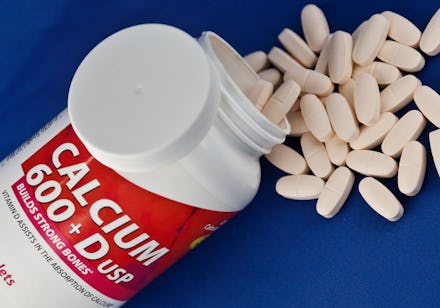Are Vitamin Supplements Good for You? It Depends on What You're Taking

It's hard to get the recommended daily servings of fruits and vegetables; vitamin supplements offer an alluring workaround for those of us whose meals are more convenience- than nutrient-focused. But do they even work? Or are those calcium tablets just a comforting lie we tell ourselves to quiet fears of brittle bones? According to science, the answer to that question is maybe. The research points both ways.
Read more:
For example, a 2013 editorial that appeared in the Annals of Internal Medicine made no bones about the purported fact that supplements are in no way a boon to consumer health. Entitled "Enough Is Enough: Stop Wasting Money on Vitamin and Mineral Supplements," it stated that vitamin supplements are basically a sham; that they didn't improve health over time or put people at lower risk of disease, and that some of them could even be harmful.
"What we've found time and again is that the supplements are not working," Eliseo Guallar of the Johns Hopkins Bloomberg School of Public Health and one of the editorial authors told USA Today. "We don't need to go on studying them forever."
According to Dr. JoAnn Manson — a professor at Harvard Medical School, chief of preventative medicine at Brigham and Women's Hospital and a leading investigator in VITAL, a large, randomized trial of Vitamin D and Omega-3 — many of the studies that have been done on supplements have yielded flawed results because they didn't involve placebos or sufficient control measures.
"Often the enthusiasm for these vitamins and supplements outpaces the evidence," she said. "And when the rigorous evidence is available from randomized controlled trials, often the results are at odds with the findings of the observational studies."
Observational studies don't use a placebo or implement enough controls to isolate a certain substance's effects. Taking their claims to efficacy at face value isn't advisable for that reason. However, according to the American Heart Association (AHA), supplements can be part of a healthy diet — so long as they're treated as supplements and not as replacements for nutrient-rich foods.
According to the AHA, some vitamin supplements won't be fully absorbed into the body. To improve those odds, taking supplements with food is recommended. "If taken on an empty stomach without any food, some of the fat-soluble vitamins will not be absorbed as well as they would if the supplement was consumed with a food that provides fat," Penny Kris-Etherton, Ph.D., R.D., and Distinguished Professor of Nutrition at the Pennsylvania State University's College of Health and Human Development, told the AHA.
And before throwing down whole tens of dollars for a bottle of multivitamins, doing one's due diligence is a must: Supplements can be padded with fillers that are detrimental to the consumer's health. Consult with a physician in determining what to take and what to skip. And above all, remember: Supplements are meant to bolster a healthy diet; they're not cure-alls.